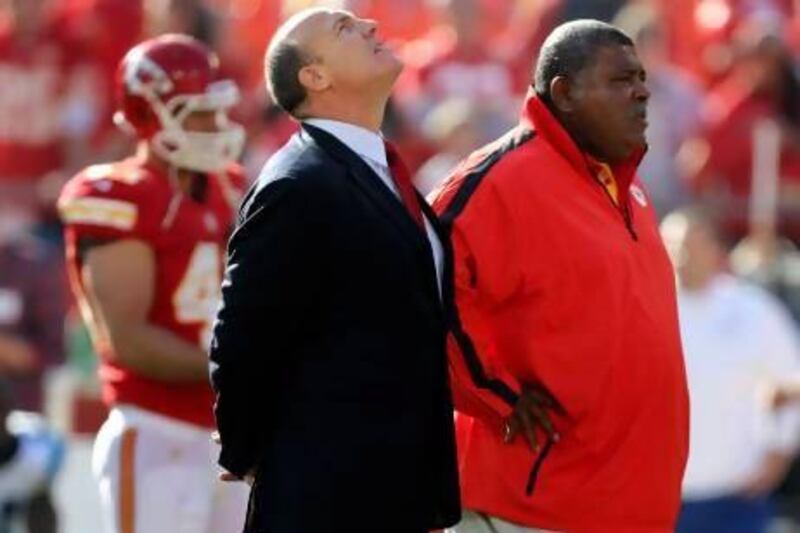On Sunday, December 7, 1941, the United States navy was devastated by a surprise attack at Pearl Harbor, in Hawaii. One day later, the country entered the Second World War. One month later, Franklin D Roosevelt, the president, instructed the Major League Baseball commissioner to go ahead with the 1942 season, saying "I honestly feel that it would be best for the country to keep baseball going."
On Friday, November 22, 1963, the US president John F Kennedy was assassinated. Two days later, all 14 NFL teams played.
On Tuesday, September 11, 2001, terror attacks on New York and Washington killed nearly 3,000 people. All 14 NFL games for the following weekend were postponed until January. Baseball postponed all games through September 16.
Roger Goodell, the NFL commissioner, likely considered each of those precedents, and more, when he decided that the Kansas City Chiefs' game with the Carolina Panthers should go on yesterday despite the suicide by gunshot of the linebacker Jovan Belcher at the team's practice facility the day before.
The police in the mid-America metropolis believe Belcher murdered the mother of his child, before the very public suicide.
The decision, made public on the league's website, was met with outrage from several quarters. Bill Simmons, one of the most popular sports writers in the US, tweeted: "Such a horrible tragedy in KC. Chiefs game has to be postponed 1 or 2 days. How is this even a question? Do the right thing, NFL."
The apparent murder-suicide by an active athlete is nearly unprecedented in modern American sport. In 1993, the Houston Oilers tackle Jeff Alm was in an early morning car crash that killed his friend, and he shot himself a few minutes later. That instance, however, does not rise to the wrenching intimacy of Belcher's suicide, which came in broad daylight as the coach of the Chiefs, Romeo Crennel, and the team's general manager, Scott Pioli, tried to talk Belcher out of killing himself.
To explain the event, early speculation centred on mental illness brought on by concussions. American footballers are highly susceptible to head trauma, and several prominent former NFL players have killed themselves in recent years, most recently the oft-concussed linebacker Junior Seau.
NFL teams are required by the league to post weekly lists of players who may not be available to play, and according to the newspaper USA Today only once in his four-year NFL career was Belcher said to be limited in training because of a head injury - though he may have suffered concussions anywhere throughout his football career, which included four years at the University of Maine and four years of high school. Too, NFL teams and players had a history of ignoring concussions before the issue came into focus in the past two years.
Until Saturday, Belcher's time in the NFL was notable primarily for his having over-achieved. He was not drafted by the league out of college, but was signed by the Chiefs in 2009 and by 2010 had forced his way into the line-up.
He was not known for being unstable or irrational. He apparently had no criminal background. He did not create much of a stir at all; the Chiefs are a bad team, and he was not known for being loquacious. Not one NFL fan in five would have been familiar with him.
They all know him now, and that left Goodell, the NFL commissioner since 2006, with the difficult call. To play or not to play? He knew that Pete Rozelle, the commissioner when Kennedy was shot, later said playing on was his worst decision.
The Chiefs-Panthers game kicked off at noon yesterday in Kansas City (10pm in the UAE), as scheduled. It had to be a day of sorrow and distraction and confusion for Chiefs players, coaches and fans, and anger by critics towards Goodell and the NFL.
A strong case can be made that the game should have been backed up a few days to let everyone come to grips with an ugly situation. A case also can be made that a return to routine, so prized in the tightly scripted NFL, was the best way forward, and that to put off the game might have been seen as a tribute to an alleged murderer.
Perhaps Goodell's decision was influenced by this: early in the morning of September 23, 1978, the California Angels outfielder Lyman Bostock was shot to death near Chicago. Less than 12 hours later, the Angels played the Chicago White Sox and won 7-3. The urge to play on is a strong one in American sports.
[ poberjuerge@thenational.ae ]
Follow us
[ @SprtNationalUAE ]





